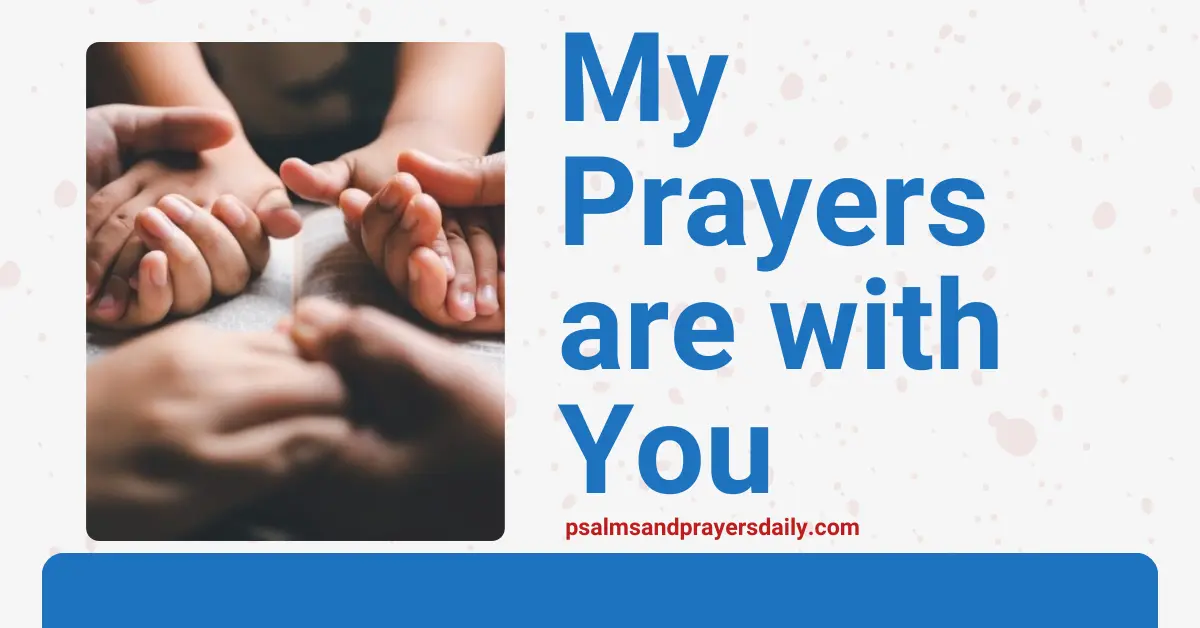The phrase “My prayers are with you” carries a deep and timeless power. It’s a way of saying, “You are not alone.” In moments of pain, loss, or fear, these words remind others that they are being lifted before God—that someone is interceding for their peace and strength.
But in a world that often values quick replies and short texts, this sacred phrase can sometimes feel overused or misunderstood. To truly comfort someone, we must speak it from the heart and back it up with compassion.
Here are 10 meaningful ways to understand, say, and personalize the phrase “My prayers are with you.”
1. Understand the True Meaning Behind the Phrase
When you say “My prayers are with you,” you’re offering more than sympathy—you’re offering spiritual support. It means you’re actively asking God to help the person, believing that divine power can bring peace where words cannot.
James 5:16 reminds us, “The prayer of a righteous person is powerful and effective.” Your promise to pray should never be empty—it’s a declaration of faith that God listens and cares.
2. Use It During Times of Grief
When someone has lost a loved one, words can feel small compared to their pain. Yet a heartfelt, “My prayers are with you,” offers warmth and strength in their sorrow.
You can say:
“My prayers are with you and your family during this difficult time. May God’s peace surround you and His love carry you through.”
This phrase should be spoken gently, or written in a condolence card. When paired with presence—like visiting, helping with meals, or simply listening—it becomes even more powerful.
(2 Corinthians 1:3–4)
3. Offer It During Illness or Health Struggles
Sickness—whether physical or emotional—often brings fear and discouragement. When you tell someone, “My prayers are with you,” you remind them that God still sees, heals, and cares.
Try saying:
“My prayers are with you as you go through this treatment. May God restore your strength and bring complete healing.”
Your sincerity can turn anxiety into hope. Prayer connects the person’s weakness with God’s power.
(Psalm 41:3)
4. Use It in Times of Uncertainty
Life’s unpredictable moments—job loss, exams, financial challenges—can leave people feeling lost. A message like “My prayers are with you during this season” tells them they’re not forgotten.
You might write:
“My prayers are with you as you make these big decisions. May God guide your steps and open doors of opportunity.”
Faithful prayer helps replace fear with trust in God’s timing.
(Proverbs 3:5–6)
5. Adapt It for Comfort Without Overusing It
Because the phrase “My prayers are with you” is so common, it can sound automatic if used without thought. The key is personalization.
Instead of only saying the phrase, add something specific:
“My prayers are with you as you grieve your father’s passing. He was a kind man, and his legacy will live on through you.”
This shows genuine care and helps the person feel seen, not just pitied.
6. Pair It with Action
Prayer is powerful—but compassion is even stronger when followed by action. James 2:17 reminds us that faith without works is dead.
When you say “My prayers are with you,” ask yourself: What can I do to show it?
You can:
- Bring a meal to a grieving friend.
- Send a card or handwritten note.
- Offer to babysit, run errands, or just sit quietly with them.
Actions make your prayers tangible and show that your words are rooted in love.
7. Offer Comfort Through Written Messages
Sometimes people struggle to speak when emotions are high. Written words can offer steady comfort. Here are a few message examples using the phrase:
- “My prayers are with you today and always. May you feel God’s hand of comfort in your heart.”
- “Though I may not understand your pain, my prayers are with you, asking God to bring peace to your soul.”
- “My prayers are with you in this storm. You are stronger than you know, and God is with you.”
These can be sent by text, email, card, or letter—whatever feels most appropriate.
(Philippians 4:6–7)
8. Find Alternative Ways to Express the Same Heart
Not everyone responds well to religious language, especially in mixed faith settings. But the compassion behind “My prayers are with you” can still be communicated in other words, such as:
- “You’re in my thoughts, and I’m asking God to give you strength.”
- “Holding you in prayer and believing for peace in your heart.”
- “You’re not alone—I’m standing with you and asking God to guide you.”
This allows your sincerity to shine without sounding rehearsed or impersonal.
9. Use It as a Reminder to Actually Pray
When you say “My prayers are with you,” make sure they truly are. It’s easy to say the words and forget later—but your faithfulness matters.
Take a moment to pause and pray:
“Lord, I lift up my friend. Please comfort them, strengthen them, and remind them of Your love today.”
Even a short, quiet prayer honors the promise you made. When you pray intentionally, you participate in God’s healing work.
(Colossians 1:9)
10. Let It Be a Way to Share Hope
At its heart, saying “My prayers are with you” points people toward hope—especially when life feels hopeless. You’re not claiming to fix their pain; you’re helping them remember that God hasn’t forgotten them.
You can gently say:
“My prayers are with you. May this storm pass quickly, and may joy return to your life soon.”
Your faith can help rekindle theirs. Hope is contagious, especially when carried by kindness.
(Romans 15:13)
11. When You Don’t Know What Else to Say
There are times when words fail. The pain may be too great or the situation too heavy. In those moments, “My prayers are with you” becomes a whisper of love.
Even if the person doesn’t respond, trust that your prayer reaches God. You can silently ask Him to comfort them in ways you cannot.
(Romans 8:26)
Examples of “My Prayers Are With You” in Real-Life Contexts
Here are short, thoughtful ways to use the phrase across life situations:
- For loss: “My prayers are with you as you mourn. May the Lord’s comfort surround you.”
- For illness: “My prayers are with you today. May God’s healing hands touch you.”
- For exams: “My prayers are with you. May your mind be calm and your answers clear.”
- For travel: “My prayers are with you as you journey—may you be safe and refreshed.”
- For anxiety: “My prayers are with you in this season. God’s peace will guard your heart.”
- For success: “My prayers are with you as you take this step forward. May God favor your efforts.”
These messages can be spoken, written, or shared digitally. What matters most is sincerity.
Combine the Phrase with a Bible Verse
Including Scripture makes your message stronger. For example:
- “My prayers are with you. Remember Isaiah 41:10—‘Do not fear, for I am with you.’”
- “My prayers are with you. Philippians 4:13 reminds us, ‘I can do all things through Christ who strengthens me.’”
- “My prayers are with you. Psalm 34:18 says, ‘The Lord is close to the brokenhearted.’”
God’s Word gives eternal comfort that human language cannot.
Avoid Using It Casually or Without Thought
Because “My prayers are with you” is sacred, it shouldn’t be thrown around casually. Avoid using it to fill silence or sound polite. Instead, pause—think about what the person truly needs to hear.
If you don’t feel able to pray, offer an honest word like, “I’m thinking of you deeply and holding space for peace in your life.” Authenticity matters more than familiarity.
Pray Immediately After You Say It
Right after telling someone, “My prayers are with you,” take a moment to actually pray for them—quietly or aloud. Prayer doesn’t have to be long; it just needs to be heartfelt.
You can say:
“Lord, please comfort my friend. Let Your peace, which surpasses understanding, guard their heart.”
This moment of prayer turns compassion into connection. It shows you truly mean what you said.
Conclusion
The phrase “My prayers are with you” remains one of the most comforting expressions in times of loss, hardship, and fear. It bridges distance, strengthens faith, and speaks love when words fall short.
Yet its power depends on sincerity. When you say it from your heart, when you mean it—and when you follow it with prayer or action—it becomes more than a phrase. It becomes ministry.
1 Thessalonians 5:11 reminds us, “Therefore encourage one another and build each other up.” Your words, no matter how simple, can become a lifeline to someone’s soul.
So, the next time you say “My prayers are with you,” let it be real, warm, and compassionate. Let it carry not just comfort—but the assurance that God still listens, still loves, and still moves in response to faith-filled prayer.









